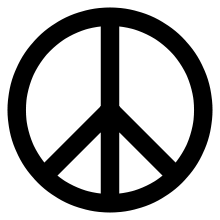Nonviolent Peaceforce
 | |
| Established | 2003 |
|---|---|
| Type | International NGO |
| Headquarters | Brussels, Belgium |
Region served | Worldwide |
| Website |
nonviolentpeaceforce |
Nonviolent Peaceforce (NP) is a nonpartisan unarmed peacekeeping organization with the goal to protect civilians and reduce violence in areas affected by armed conflict. NP holds Special Consultative Status with the Economic and Social Council of the United Nations,[1] and has been endorsed by nine Nobel Peace Prize laureates, including the Dalai Lama and former South African Archbishop Desmond Tutu.[2]
History
The organization was founded by David Ray Hartsough, a US Quaker and civil rights activist, and Mel Duncan, former US member of the Nicaragua coffee/cotton brigades during the Contra war of 1984. The organization, first prompted by a 1999 citizens' conference in The Hague,[3] was founded in New Delhi in 2002.[4]
Mel Duncan served as Executive Director until 2009, in Minneapolis, MN. The central office moved to Brussels, Belgium in 2010 under Executive Director Tim Wallis, while retaining its U.S. operations in Minneapolis, as of December 2013 near the Loring Park neighborhood.[2] The organization is now led by Doris Mariani, and is registered in the US as a 501(c)(3) organization and in Belgium as an AISBL.
The pilot project of NP was started in 2003 in Sri Lanka.[5] NP peacekeepers were at work there between 2003 and 2008 but they could not stop the war that reoccurred in 2008 and came to an end only when the SLA defeated LTEE in May 2009. NP later had a short-term engagement in Guatemala, and then deployed peacekeepers in the Philippines and in South Sudan. In 2012 it took up a new mission in the South Caucasus.[6]
In Mindanao, Philippines a ceasefire was the starting point for the invitation of NP by local peace organizations (e.g. Mindanao peoples Caucus and Consortium of Bangsamoro Civil Society). After a short time, NP Philippines was part of the International Monitoring Team to oversee the ceasefire agreement between the Philippine Army and the Moro Islamic Liberation Front (MILF), a guerilla organization that sought independence and later self-determination for the Southern island of Mindanao. NP is responsible for the Civilian Protection Component which had its antecedents (and still relies on) the Independent Fact-Finding Committee and Bantay Ceasefire.[7]
In Guatemala, NP was invited by the Unidad de Protección a Defensoras y Defensores de Derechos Humanos (UDEFEGUA), the Protection Unit for Human Rights Defenders. During the presidential elections taking place in September and November 2007, violence increased and human rights defenders were threatened; a small team focused on accompanying the human rights defenders or being present in their office day and night.
- Southern part of Sudan, now Republic of South Sudan (2010-)
After the cancellation of a proposed project in Uganda, the peace agreement between Sudan and the Sudan Liberation Army as well as the planned independence referendum in South Sudan in January 2011 provided a starting point for exploring and later implementing a project in Sudan/South Sudan. Two Sudanese organizations, the Institute for the Promotion of Civil Society (IPCS) and the Sudanese Organization for Nonviolence and Development (SONAD), invited NP to assist in preventing violence before and during the forthcoming elections and referendum.[8] The more general task, also for the time after the referendum, was to build up local expertise for preventing and mediating in inter-ethnic conflicts in the region. The assignment was led by a Sri Lankan peacekeeper who was responsible for the protection of children in Sri Lanka. In South Sudan UNICEF financed a similar project, especially for Ugandan child soldiers who were recruited by the Lord's Resistance Army (LRA). The field offices have been extended to eight teams.[9]
Organizational Elements
The work of NP consists of three pillars: projects in conflict areas; lobbying, especially within United Nations as well as European Commission and European Parliament; training. The organizational and administrative day-to-day duties are carried out by the secretariat- headed by the Executive Director. The programmatic work (on projects, explorations, budget and policies) is the task of the international board called International Governing Council (IGC).[10]
Awards
Together with its founder Mel Duncan, the organization in 2007 received the International Pfeffer Peace Award from the Fellowship of Reconciliation.[11]
See also
External links
References
- ↑ http://www.un.org/press/en/2007/ecosoc6267.doc.htm
- 1 2 Hopfensperger, Jean (December 16, 2013). "Philanthropy beat: Nonviolent Peaceforce gets unexpected gift". Minneapolis Star Tribune.
- ↑ Shifferd, Kent D. (2011). From War to Peace: A Guide to the Next Hundred Years. McFarland. p. 181. ISBN 9780786485239.
- ↑ Sharma, Arvind (2010). The World's Religions: A Contemporary Reader. Fortress Press. p. 73. ISBN 9780800697464.
- ↑ Wallace, M. S. (2013). "Security Without Weapons: Nonviolent Peaceforce in Sri Lanka". In Joseph R. Rudolph, William J. Lahneman. From Mediation to Nation-Building: Third Parties and the Management of Communal Conflict. Lexington. pp. 333–51. ISBN 9780739176955.
- ↑ Schweitzer, Christine: Humanitarian Protection as an Additional Function of Humanitarian, Development and Peace Projects – or Rather a Task Requiring Experts?”, in: id. (Ed.): Civilian Peacekeeping – A Barely Trapped Resource, Wahlenau 2010, p. 49
- ↑ Lustenberger, Philipp: Civilian Protection: From the International to the Grassroots Level, in: Zartman, I.W./P.T. Hopman (Eds.): Mindanao. Understanding Conflict 2011, Washington 2011, p. 52-54
- ↑ see: interview with Oloo Otieno, in: Ricci, Andrea (Ed.): From Early Warning to Early Action? The Debate on the enhancement of the EU's crisis response capability continues, European Commission, DG External Relations, Brüssel 2008 [part 2: Crisis Response - Mediation and Peacekeeping] = http://eeas.europa.eu/ifs/publications/book_2_en.htm, last retrieved: 09.08.2012)
- ↑ http://www.nonviolentpeaceforce.org/np-deploying-8-field-teams-south-sudan, last retrieved: 09.08.2012)
- ↑ Mel Duncan, Mark Zissman, Patrick Savaiano: Nonviolent Peaceforce: A Realistic Choice for the Future, in. Stout, Chris E. (Ed.): The New Humanitarians: Inspirations, Innovations, and Blueprints for Visionaries, Vol. 3, Changing Sustainable Development and Social Justice, Westport CT/London 2009, pp. 89-104.
- ↑ "FOR to Hold Third Annual Festival of Peace in Nyack". Fellowship of Reconciliation. Retrieved 18 November 2015.
